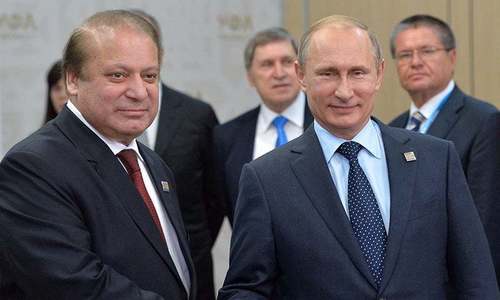KARACHI: The situation in Afghanistan has aggravated and Russia is concerned about it. The Afghan government has suffered during operations against the Taliban. Our position is that both sides should sit at the table and resolve the issue. The IS concentration in Afghanistan is a matter of concern for all.
This was stated by the consul general of the Russian Federation in Karachi, Dr Aleksandr G. Khozin, while answering a question after an hour-long, detailed address to the press highlighting Russia’s position on Europe, the Palestinian-Israel situation, the Syrian situation and Pakistan-Russia ties.
In response to a query on the Palestine issue, Dr Khozin said both [Israel and Palestine] sides needed to be persuaded to talk to each other. What’s clear was that Muslim countries would not understand the behaviour of the US on the issue.
No one has the right to dictate to any country how to exist or what is good for it, says diplomat
Speaking about President Trump’s election in the US, he said it’s the choice of the American public. It’s up to America who to choose as its president. The Russian president was ready to discuss issues with them [America].
Earlier, during his briefing Dr Khozin said the Russian foreign office believed in peaceful coexistence, and it was peace that could bring security [to the world]. But no one had the right to dictate to any country how to exist or what was good for it. America’s efforts to become a unipolar power had failed as old crises remained unresolved and new challenges emerged. In a multipolar world there could be more diversity and acceptance of one another’s traditions, culture and faith. Any attempt to slow down this process would lead to creating instability. The world we lived in demanded an acceptance of diverse traditions, which would eventually sustain its growth.
On the situation in Syria, the consul general expressed similar views. He said no one had the right to dictate what would be its future course. It’s up to the Syrian people to decide how to lead their lives. “We will continue to support Syria,” he remarked underlining Russia’s position on the Arab country.
On the Palestinian-Israel situation, Dr Khozin said on Dec 21, 128 countries voted in favour of a UN resolution and America threatened those who had voted against its stance that they would risk losing its aid and support. The US position could further complicate the situation in the region, whereas Russia’s position on the issue had not changed: it spoke in favour of direct talks between Israel and Palestine.
On Nato forces’ expansion near Russia’s border, Dr Khozin said it would increase tensions in the area. “We are taking measures to increase our capacity.” Talking about the peacekeeping mission in Ukraine, he said Ukraine refused Russia’s proposal in that regard. He pointed out that the US was supplying arms to Ukraine.
Coming to Russia-Pakistan ties, Dr Khozin said recently on the sidelines of the General Assembly sessions the foreign ministers of the two countries met and discussed Afghanistan and counter-terrorism. He claimed that in the last three to four years the Pak-Russia relationship had strengthened. Both countries were trying to find ways to bring about peace in the region. “We support each other.”
Dr Khozin said trade between Pakistan and Russia had increased considerably in recent times. Business links were getting stronger as governments of the two countries looking at areas that could prove mutually beneficial.
Responding to the question of whether Russian President Vladimir Putin would visit Pakistan, he said diplomats’ job was to build bridges. It’s up to Mr Putin to visit Pakistan.
Published in Dawn, December 28th, 2017














































